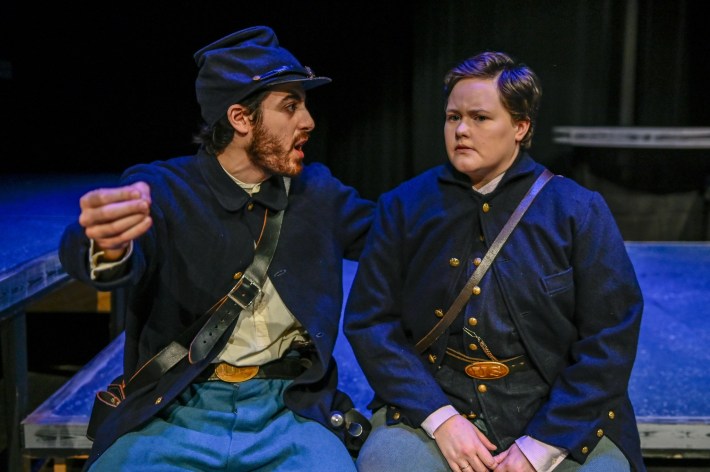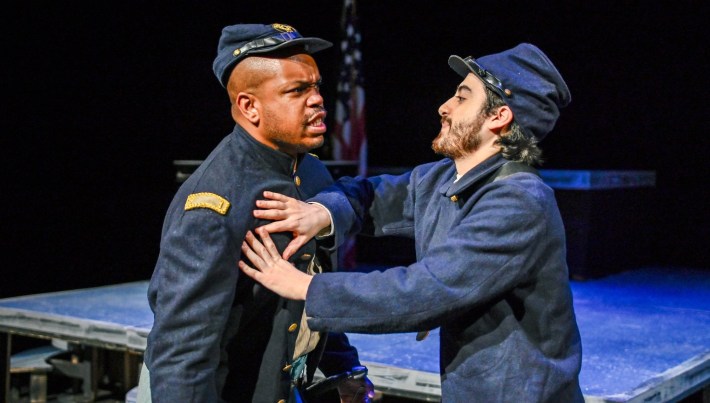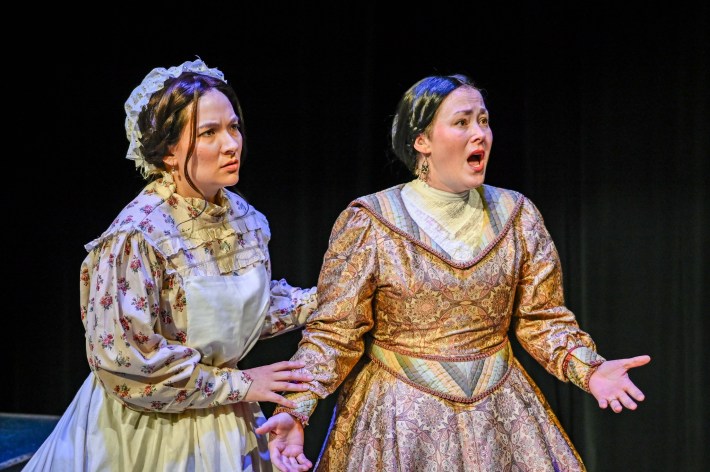Tulsa Shakespeare Company & Theatre North: Othello
Tulsa Performing Arts Center
October 25, 2025
“I swear I used to understand how words work,” I whispered to myself during the first 10 minutes of Tulsa Shakespeare Company and Theatre North’s recent co-production of Othello. As Iago took the stage and started into his opening lines, I leaned way forward, listening hard, lightly panicking—my eyes narrowed in that “turning down the radio to drive better in the rain” squint—as I felt keenly the absence of every single IQ point I’m sure I lost during Covid.
Welcome to watching a Shakespeare play in 2025. If you’re not addicted to short-form content, you’ll probably be fine. For the rest of us, those first 10 minutes are likely to be rough.
It’s not that the actor was hard to understand. Quite the opposite: Karam Alkhatib’s speech was as natural-sounding as you can get in a production of Shakespeare. It’s more that a 17th-century peasant apparently had more capacity for focus and comprehension of complex language than I do anymore.
After a while, though, once I stopped fighting my own brain fog and surrendered to the experience, I started to be able to process it—and the play started hitting with a freshness, edge, and emotional depth that’s a quite a bit harder to come by in the attention-shredding dumb zone of my phone.

After a long slow spell, Shakespeare-wise, Tulsa is suddenly experiencing a Bard-issance, thanks in part to Tulsa Shakespeare Company. Launched last year, the troupe takes a “language immersion” approach to these 400-year-old plays: throw the viewer in at the deep end and they’ll probably eventually swim (or at least doggy paddle). Directed by Brock England, the actors speak at regular conversational speed: no weighty pauses or emphatic iambic pentameter. They’re not going to wait for you to follow: they just go.
Pinned to your seat, with escape via scrolling not an option, your choices are “keep up” or “just vibe with the action”—both of which, in my experience, make for an enjoyable time with this troupe’s shows, whether or not I catch everything they’re throwing. The speed with which they get through the text also means you’re not in the theater for five hours, which is a kindness.
This somewhat rough-and-tumble approach is key to the company’s mission: “Shakespeare wrote for the ‘groundlings,’ the common person who paid for the cheap seat. We want to bring the bard down from the lofty perches of academia and scholarly debate and return his works back to the audience he intended through accessible and magical theatrical experiences.”
In the past year or so, those experiences have taken the form of pop-up “Spicy Shakespeare” readings at local bookstores, a series of one-night-only scenes called “War of Words,” educational offerings, and a production of Twelfth Night in the vaulted hall of the German-American Society. Before Othello, the company hosted a workshop by Carlos Moreno about the Reconstruction Era in which the play would be set.
Co-presented with Theatre North, Tulsa’s oldest Black-led theatre company (which had an Othello in the works before the pandemic shut it down), this Othello—a story about a Black general undone by the ambition of a “friend”—made a move like the one Shakespeare himself made, setting the story in a closer-to-now historical context so its timeless themes could be more relatable. The props and costumes here, some supplied by local Civil War re-enactors, gave the production an authentically rusty, hand-stitched, sweat-stained, sitting-on-a-powder-keg dimension. Did the 1860s accoutrements help me connect to the play’s exploration of systemic racism and the stresses of war? Maybe a little—although honestly, those realities are still so present today that an even more contemporary setting might have done just as well.
But the effort doesn’t go unappreciated. These aren’t companies that are counting on the name “Shakespeare” to bring the old regulars in. Like Pembroke Players and Riffraff (two other groups putting out fresh interpretations of classic works), they’re digging deep and playing hard to draw the art and the audience together.

Shows like this also draw serious talent into the local theatre scene—people who’ve trained and performed in other cities who now have a place to do Shakespeare stuff in Tulsa. The wide range of experience among the actors in this production bodes really well for Tulsa theatre; there’s nothing like a difficult Shakespeare play to challenge any actor to rise to meet the whole, and the newcomers here brought just as much heat as those with many performances under their belts.
It was exciting to see a seasoned local like David Harris get into a role like Othello and root around in it, finding a mellow, broad-shouldered ease in a world that’s always ready to—and then, devastatingly, does—strip him of assurance. As Iago, Karam Alkhatib (a Jenks and OCU theatre grad who’s done two seasons at Oklahoma Shakespeare in the Park) brought a striking physical contrast, wispy and shifting. He played Iago as a genial trickster, a right-hand-man turned quick-tongued con, from whose dark eyes a real darkness flashed now and then, so quickly that I questioned (like Othello, maybe) whether I’d seen it or not.
Corinna “Sparrow” Browning, a recent transplant from Austin, brings an impressive theatre resume and jaw-dropping talent to the Tulsa scene. Her clear-voiced Desdemona, innocent but not naive, was a master class in generous, ultra-present acting, and her rendition of the play's famous “Willow Song” brought the whole house to a reverent hush. Every supporting actor gave their role a thrilling energy.

You’ll have to wait till early next summer to see Tulsa Shakespeare Company again, but in the meantime, Tulsa’s bursting at the seams with classic plays: there’s Oedipus Rex and a Romeo & Juliet adaptation this weekend, Chekov’s The Seagull coming up next month, Antigone in the spring. And next up from Theatre North is Nat Turner in Jerusalem by New York-based playwright Nathan Alan Davis, who has also written a play about the Tulsa Race Massacre, set on Standpipe Hill.
Take your busted brain to one of these shows. Whatever minor resistance you might feel when meeting one of these plays IRL is totally worth enduring for the human adventure—from the intimate machinations of an individual soul to the tragic, ridiculous expanse of sociopolitical reality—that's waiting on the other side.






